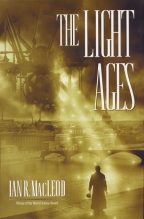The Light Years
Ian R. Macleod
Pegnuin-Putnam/Ace Books
US Hardback First
ISBN: 0 441 01055 5
456 pages; $23.95
Date Reviewed: 5th September 2003
Reviewed by: Serena Trowbridge © 2003

REFERENCES
COLUMNS
|
|
|
The Light YearsIan R. MacleodPegnuin-Putnam/Ace BooksUS Hardback FirstISBN: 0 441 01055 5456 pages; $23.95Date Reviewed: 5th September 2003Reviewed by: Serena Trowbridge © 2003 |
|
|
REFERENCES |
COLUMNS |
When I commenced reading Ian MacLeod's "The Light Ages", I knew nothing about the author. Research, however, has showed that he grew up near where I live (in Birmingham, UK), which explains the delightful (to me) familiarity of the cityscape and industrial landscape which he evokes with such a delicate touch.
"The Light Ages" is set in a world ruled by industry, the business of producing aether, which is a magical substance that can turn shoddy workmanship to strong craftsmanship and strengthen the weak, but also maims and kills. It is about technology and social politics, and the neo-Victorian setting is a perfect backdrop for the woes of an industrial society, and in many ways this novel is a warning to society. Here, the cultural diversity of nineteenth century Britain is hidden in an underworld of fantasy and fear in a land ruled by the iron rods of industry and trade, where individuality, creativity and even contentment are stifled. Happiness is occasionally permitted - because we know that happiness is fleeting and only makes the misery that follows seem more unbearable. It is in this world that we meet the central character, Robert Borrows, who grows from a boy dreamer in an industrial northern town to an idealistic young man fighting political and social battles in a Dickensian London.
The portrayal of Robert is strongly reminiscent of Pip in "Great Expectations", in his childhood dream of the unattainable Annalise, his dreams of escape from the poverty and misery in which he lives, and his ambiguous and awkward relationship with women, stemming from his mother, affected by the aether and a source of embarrassment to a child growing up. MacLeod's portrayal of this other London also owes a great deal to the landscape set by Dickens, and is haunted by the wraiths of "Greast Expectations" in plot and "Bleak House" in tone and issues. There are also attractive echoes of Philip Pullman's writing in this world that is familiar but somehow other, dominated by the all-powerful aether much as Pullman's worlds are dominated by Dust.
MacLeod's rich prose style will not disappoint, either - he employs alliterative adjectives, surprising nouns and a depth of language that is both enjoyable and useful, enhancing the interweaving of the plot, although unfortunately a glut of typographical errors slightly mar the overall effect. The intellectualism, idealism and sense of hopelessness inherent in the novel are firmly underpinned by the sinister booming of the aether mines, a sound that haunted Robert's childhood and from which he cannot escape, and this sonorous haunting sound is echoed in the narrative.
Like many of the best sci fi novels, it is the notion of allegory that will inspire the reader most; the moment when one makes the connection between the gods and devils of this industrial age and our own is what makes this book particularly haunting.